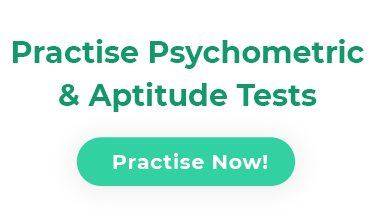If you’re applying to new positions, you might be asked to take an aptitude test. Aptitude exams are pre-employment assessments used to screen interested applicants. Because the recruitment process can be long and arduous, large companies have turned to online assessments in order to save time and money.
While not necessarily difficult, aptitude exams can be tricky. If you’ve received notice that you’ll need to take one or more, you’ll want to prepare in advance. While many of the questions are straightforward, logic and abstract thinking questions, for example, are much more involved. If you haven’t seen these kinds of questions before, you’ll be at a disadvantage.
You won’t always get a second chance to take the test, and because the time limits on these tests are often very severe, you could be giving up precious points if you aren’t familiar with the questions and the strategies required to answer them.
Thankfully, you can find plenty of aptitude test questions here on our site for free. We want to make sure you’re fully prepared when you head into the assessment center, and we know from experience that practice is the surest way to get there. So, go ahead and click on our questions tab to get started immediately.
What Is an Aptitude Test?
An aptitude test or a cognitive ability test is a general word for a pre-employment exam. These tests are designed to evaluate both your fluid intelligence, your innate capacity for making connections and recognising patterns, and your crystallised intelligence, the knowledge you’ve acquired through education and experience. So, while some questions will ask you to solve equations or answer questions about simple machines, other questions will ask you to analyse abstract patterns.
Many of these tests look similar to the SAT’s and ACT’s, which you probably took when applying to college. Nonetheless, there are a wide variety of test providers and subjects, and no two tests look exactly alike. Because these tests are predominantly online, most of them are multiple choice tests. The vast majority of them are also timed.
The test or tests that you take will depend on the job to which you’re applying. Verbal, numerical, and logical exams are the most common form of aptitude tests, but there is still plenty of variety within these categories. Many companies actually require interested candidates to pass multiple exams and then evaluate the applicant using a composite score.
How to Prepare for Aptitude Tests?
Many clever candidates assume that they won’t have to study for pre-employment exams, but that couldn’t be further from the truth. It is true that aptitude assessments are designed to assess your intelligence, and practising won’t drastically improve your cognitive abilities.
However, practice will help you to learn the strategies you’ll need to answer questions as efficiently as possible. Even if your IQ is above 130, if you come in without having prepared at all, you won’t know how best to apply your knowledge. While you still might do very well, you’ll want to commit to some aptitude test practice at least a few days before the assessment if you want to give yourself a competitive edge during the recruitment process.
There are two key steps to preparation. First, you should complete as many practice questions as you can. Make sure that you complete these practice questions under timed conditions. The time limit is, in most cases, an essential component of the test, without which the exam would be far easier.
Secondly, you’ll want to review your answers carefully. You should obviously correct any wrong answers, but you shouldn’t stop there. Once you’ve reviewed all of your answers, you’ll want to go back again to see whether there was an easier way to answer the question.
Why Do I Need to Do Aptitude Test Preparation?
Employers administer this test to interested applicants because they know how important it is to find good employees. Large companies waste thousands upon thousands of dollars on poor hires and lazy employees. Besides re-hiring and training a new employee, companies will pay in loss of productivity and morale. Worse still, poor employees can affect the company culture overall making it harder for other employees to function at their best.
According to research, intelligence, along with personality and dedication of course, is one of the most important qualities in an employee. Clever employees pick up skills more quickly and require less instruction. They can analyse and remember large amounts of information, and they can generally handle more responsibilities.
Your aptitude test won’t determine, ultimately, whether you earn the job or not. However, it will help you land an interview. Because aptitude tests are completely automated, a passing score will allow you to advance to the next round and help you to separate yourself from your competitors.
Employers rely heavily on these exams because they’ve been proven to be very accurate. Some individuals are, unfortunately, poor test takers. However, aptitude questions are standardised, so they tell hiring managers more about individuals in a group than a mere one-page resume, which, in many cases, looks very similar to every other resume.
Final Thoughts on Aptitude Test Preparation:
Aptitude tests are rarely easy, and sometimes it seems as if the recruitment process takes more time than it’s worth. However, they are important, and they are your key to a position in a large firm with ample opportunity for growth. So, take some time to peruse our free question and sample test database, and do your best to practice as much as you can before heading out to the assessment centre.




